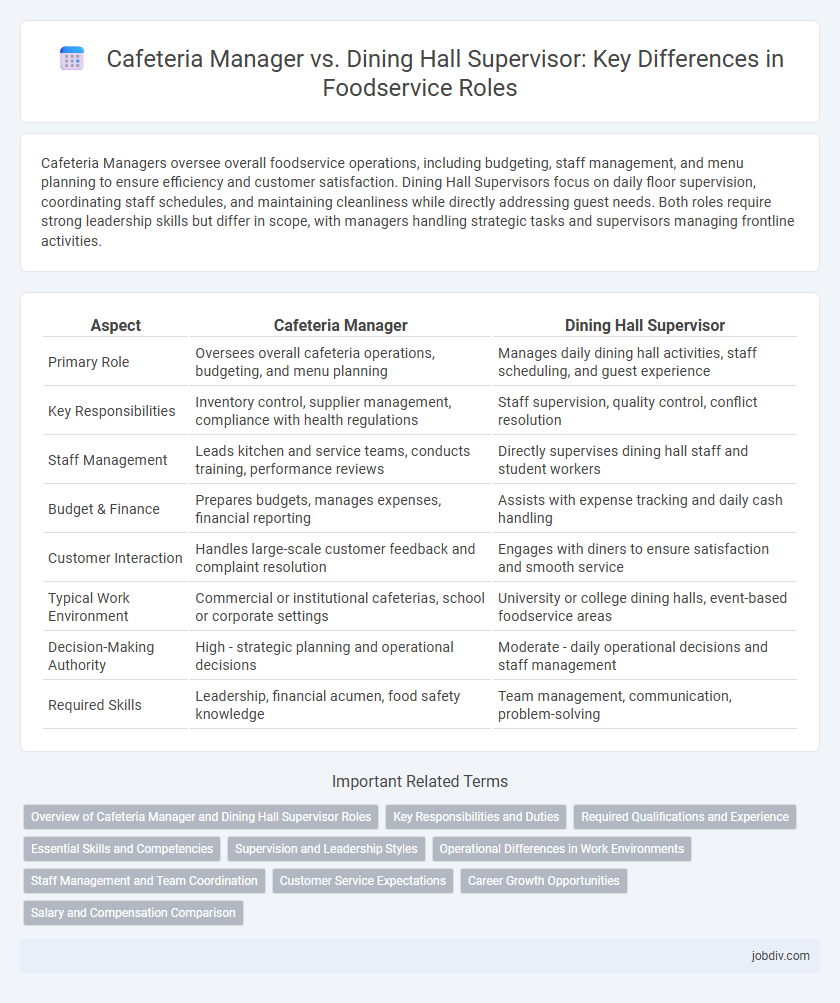Cafeteria Managers oversee overall foodservice operations, including budgeting, staff management, and menu planning to ensure efficiency and customer satisfaction. Dining Hall Supervisors focus on daily floor supervision, coordinating staff schedules, and maintaining cleanliness while directly addressing guest needs. Both roles require strong leadership skills but differ in scope, with managers handling strategic tasks and supervisors managing frontline activities.
Table of Comparison
| Aspect | Cafeteria Manager | Dining Hall Supervisor |
|---|---|---|
| Primary Role | Oversees overall cafeteria operations, budgeting, and menu planning | Manages daily dining hall activities, staff scheduling, and guest experience |
| Key Responsibilities | Inventory control, supplier management, compliance with health regulations | Staff supervision, quality control, conflict resolution |
| Staff Management | Leads kitchen and service teams, conducts training, performance reviews | Directly supervises dining hall staff and student workers |
| Budget & Finance | Prepares budgets, manages expenses, financial reporting | Assists with expense tracking and daily cash handling |
| Customer Interaction | Handles large-scale customer feedback and complaint resolution | Engages with diners to ensure satisfaction and smooth service |
| Typical Work Environment | Commercial or institutional cafeterias, school or corporate settings | University or college dining halls, event-based foodservice areas |
| Decision-Making Authority | High - strategic planning and operational decisions | Moderate - daily operational decisions and staff management |
| Required Skills | Leadership, financial acumen, food safety knowledge | Team management, communication, problem-solving |
Overview of Cafeteria Manager and Dining Hall Supervisor Roles
Cafeteria Managers oversee daily operations, including menu planning, staff supervision, and inventory control to ensure efficient foodservice delivery. Dining Hall Supervisors focus on managing dining area logistics, coordinating staff schedules, and maintaining food safety standards to provide a positive customer experience. Both roles require strong leadership and communication skills but differ in operational scope and direct involvement with kitchen processes.
Key Responsibilities and Duties
Cafeteria Managers oversee menu planning, inventory control, and staff scheduling to ensure efficient daily operations in foodservice establishments, emphasizing quality control and customer satisfaction. Dining Hall Supervisors focus on monitoring food service delivery, maintaining sanitation standards, and coordinating dining staff to provide a seamless guest experience in high-volume dining settings. Both roles require strong leadership skills, compliance with health regulations, and effective communication to manage foodservice environments effectively.
Required Qualifications and Experience
Cafeteria Managers typically require a bachelor's degree in hospitality management or nutrition along with 3-5 years of foodservice supervisory experience, emphasizing inventory control and cost management. Dining Hall Supervisors often need a high school diploma or associate degree paired with 1-3 years in foodservice or dining operations, focusing on staff coordination and customer service. Both roles benefit from certifications like ServSafe and skills in scheduling, sanitation compliance, and team leadership.
Essential Skills and Competencies
Cafeteria Managers excel in inventory control, budgeting, and staff scheduling to maintain operational efficiency and cost management. Dining Hall Supervisors demonstrate strong leadership, customer service, and conflict resolution skills to ensure a positive dining experience and smooth daily operations. Both roles require expertise in food safety compliance, team coordination, and effective communication to uphold quality standards and meet organizational goals.
Supervision and Leadership Styles
Cafeteria Managers typically employ a strategic leadership style focused on long-term planning, staff training, and operational efficiency to ensure smooth daily foodservice operations. Dining Hall Supervisors emphasize direct supervision and hands-on management, addressing immediate concerns and maintaining a positive dining experience through real-time problem-solving. Both roles require strong communication skills, but the manager's leadership involves broader organizational responsibilities while the supervisor concentrates on frontline team guidance.
Operational Differences in Work Environments
Cafeteria managers typically oversee high-volume foodservice operations in schools, hospitals, or corporate settings, ensuring efficient meal preparation, staff scheduling, and compliance with health regulations. Dining hall supervisors focus on smaller-scale environments such as universities or event venues where customer interaction, seating arrangements, and service quality are prioritized. Operational differences include the cafeteria manager's emphasis on inventory control and menu planning, while dining hall supervisors concentrate on guest satisfaction and managing peak service times.
Staff Management and Team Coordination
Cafeteria Managers oversee comprehensive staff management including hiring, training, and scheduling to ensure efficient daily operations in high-volume foodservice settings. Dining Hall Supervisors focus on coordinating teams during service hours, maintaining smooth workflow and addressing immediate staff challenges to uphold service quality. Both roles require strong leadership and communication skills, with the manager handling strategic staffing decisions while the supervisor manages real-time team coordination.
Customer Service Expectations
Cafeteria Managers focus on enhancing customer satisfaction by streamlining operations and ensuring menu variety meets diverse dietary needs, while Dining Hall Supervisors prioritize direct interaction with diners to resolve immediate concerns and maintain a welcoming atmosphere. Both roles require strong communication skills, but Cafeteria Managers typically handle strategic planning for service quality, whereas Dining Hall Supervisors emphasize frontline responsiveness to customer feedback. Efficient customer service in foodservice environments hinges on their collaborative efforts to balance operational efficiency with personalized dining experiences.
Career Growth Opportunities
Cafeteria Managers often experience broader career growth opportunities due to their responsibilities in budget management, staff training, and menu planning, which align with higher-level administrative roles in foodservice management. Dining Hall Supervisors typically focus on daily operations and customer service, providing a solid foundation for advancing into assistant manager or coordinator positions within large-scale foodservice organizations. Professionals aiming for executive roles benefit from developing skills in strategic planning and regulatory compliance, commonly emphasized in cafeteria manager roles.
Salary and Compensation Comparison
Cafeteria managers typically earn an average annual salary ranging from $45,000 to $60,000, reflecting their broader responsibilities in operational management and staff supervision within foodservice environments. Dining hall supervisors, while also overseeing daily foodservice activities, generally have a slightly lower salary range, averaging between $35,000 and $50,000 due to narrower scope and fewer administrative duties. Compensation packages for cafeteria managers often include benefits such as performance bonuses, health insurance, and retirement plans, which may be less comprehensive for dining hall supervisors.
Cafeteria Manager vs Dining Hall Supervisor Infographic

 jobdiv.com
jobdiv.com